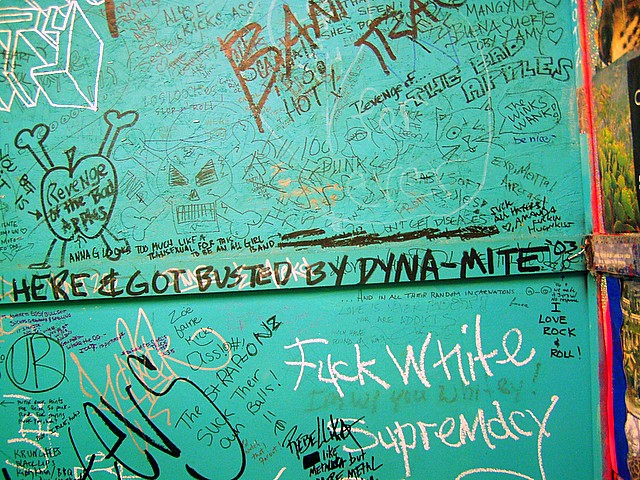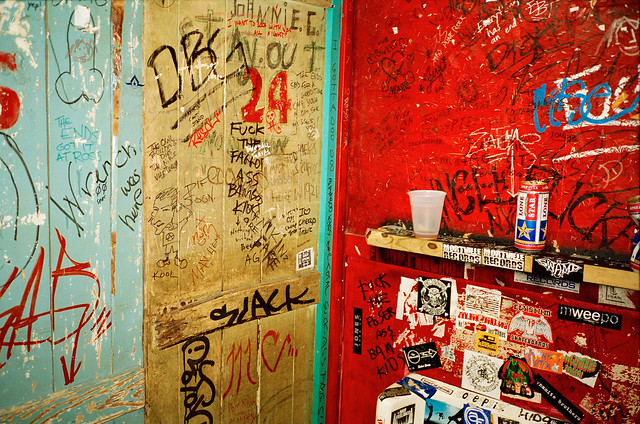Imagining a Safer Space: Building Community & Ending Harassment in Punk
At my four thousandth punk show, I was told to “never come to another punk show.” It will take a long time before I feel safe at one again.
My recent visit to Austin started out uneventfully. My vacation was simply a country-fried version of my music-filled life in Chicago, with Lone Star instead of Hamm’s, and Frito Pie instead of cheese fries. I was already infatuated with the venue Beerland, comparing it an alternate universe version of my beloved Empty Bottle.
I had actually been to Beerland two nights running, figuring that those devoted to moderation rarely achieve greatness. The second night, the opener was local band Lower Berth. Their noisy psych rock inspired three dudes in the sparse crowd to utterly lose their shit. No one else even wanted to pit, but the Aggro Trio were throwing trash cans, wrestling on the ground, and falling into people as they hastily backed even further away.
Senseless violence is not my particular favored flavor of Punk as Fuck; plus, all those dudes had at least fifty on me. I decided to enjoy the show from a more chill vantage point and perched in a booth away from the fray. At one point, I trained my eyes on the drummer. Shirtless, with translucent skin and colorless hair, the exertion made him appear bright red. One of the members of the mosh pit stumbled their way on stage to hold their lit cigarette against his bare arm. He kept drumming, unfazed.
At the time, I felt sorry for him.
THE INCIDENT
Later, after the heart-stopping headliner (Lamont Thomas and Orville Neeley’s new supergroup Blaxxx), I felt an unwelcome hand slide around my shoulders as the pink-faced drummer split off from his friends to try to hit on me. I remember feeling like I was picked at random, for being present and presumed female. I remember his come-ons were as generic as they always are; he told his name was Shaun, asked mine, maybe said something about my style. I shot him down relatively gently, asked him to stop touching me, and escaped outside, to the cool freedom and clouds of smoke of the Beerland patio.
Later, he appeared leaning against the patio fence, eyes half closed, slurring into a cell phone. “I don’t know what to tell you, man. I’m way too drunk.” That explains it, I thought to myself, silently.
If my recollection seems blurry here, it’s because the initial incident didn’t seem strange or notable to me. As inappropriate as it was, it’s not an unusual experience for me to have. I was not happy about being touched without my consent, but I wasn’t in full alarm-bells mode. Later in the night, we had another encounter that would change all that.
The drummer came over to where I was chatting with my friend Erin. Again, he took the liberty of putting his hands on my body, despite the fact I had clearly communicated earlier that I didn’t want to talk to him, and that he was not allowed to touch me. I was losing patience, and not interested in meekly relocating to another section of the bar to attempt to escape his dogged pursuit.
“I’m already told you, I’m not interested. We don’t want to talk to you,” I said, removing his arm from around me. “Go away. Leave us alone.”
He immediately switched gears, from curdled attempts at courtliness to aggression. “You probably don’t even listen to Iron Maiden,” he began, referring to my Hot Doug’s shirt. He told me that I wasn’t really punk, and I didn’t belong at the show, and called me a cunt and a poser. One of his friends (dude with long dark hair and a mustache: thank you, from the bottom of my heart) came over to physically insert himself between us, realizing Shaun was acting out of control.
Sensing he wasn’t about to stop and feeling threatened, Erin and I got up and moved to the bar so we could at least be in full view of bar staff in case non-consensual touching wasn’t the only way he was willing to physically engage me.
Shaun disappeared for a second, but when he came back he was angrier than ever. Leaning over the bar to get in my face, he continued calling me a cunt and a poser and attempting to intimidate me into leaving. Erin and I immediately started pleading with the bartender, explaining that he’d been hitting on me and touching me all night, that he’d already called me a cunt a million times, hoping that he’d intervene as Shaun’s friends dragged him away from the bar and toward the door.
“He’s like that,” the bartender confirmed. He didn’t question my story; it was obviously not out of character for homeboy to be ranting across the bar, being held back by friends, about how someone he barely knows was everything wrong with punk. He told me that he knew his bandmates and roommates, and that he’d go talk to them for me.
Meanwhile, from maybe ten feet away at the door, Shaun verbally berated me, loud enough for every single person in the club to hear. Erin and I stayed at the bar, ignoring him; he was blocking the only exit we where aware of, and as two smaller framed people we didn’t relish a physical confrontation with someone who was obviously enraged.
For about five minutes, at the top of his lungs, I was told that I was a poser and everything wrong with the punk scene. He told me that rich bitches like me were what was ruining the scene, and that I wasn’t really punk, and that I should never come to another punk show again.
I wasn’t surprised by the tactics he used to tried to hurt my feelings. It’s not the first time it’s happened to me. At one point, allegations that I was only involved in Chicago’s bike scene as a fake and a groupie were so pervasive that a member of my bike gang wrote an article addressing the misogynist implications of these attacks.
People have difficulty believing that women and trans individuals pursuing traditionally male activities are doing it authentically, for our own reasons. Our motives are cast as disingenuous; we’re called groupies, posers, and hangers-on. Male dominance is established by questioning our right to be there at all.
I don’t need to defend my credentials. First: you’re currently on my music blog where I write about the Chicago DIY scene for little to no reward, simply because I love it.
Second: if Shaun was only interested in heroically defending his scene from an outside interloper, and not simply punishing me for my lack of interest in him, why did he try to flirt with me multiple times?
Third: it honestly wouldn’t matter if I was a major label A&R rep who can’t tell Downtown Boys from The Boys there to scout a new buzz band for an Urban Outfitters model shoot. I still wouldn’t have deserved to be harassed and feel unsafe.
At one point, rather hilariously, he screamed “You probably don’t even know what Pabst Blue Ribbon is,” in reference to the large embroidered logo patch on the back of my jean vest. I was drinking a PBR tallboy at the time.
He chanted “leave, leave, leave, leave” over and over, while still blocking the exit. I was explicitly told, by someone who was paid by Beerland to gig there that night, that I was not welcome at Beerland.

Notes I made at the bar while being yelled at.
Eventually, he left the front of the bar. I would like to thank everyone who helped that happen, but I am unclear on details of what went down, since we were camped out at the bar for a while trying to wait him out.
I was able to pressure the only person I knew at Beerland besides Erin, a musician I knew from DIY shows he’d played in Chicago, to walk us to Erin’s car, terrified to bike home or walk unprotected when someone that angry with me was at large. Later, I figured out the guy who reluctantly walked us to the car is Shaun’s friend, bandmate, and roommate. I felt dumb.
THE AFTERMATH
In the morning, I woke up crying, dealing with the emotional aftermath of the trauma I had experienced. Having my physical space violated over and over by someone who heard the word no, ignored it, and escalated put me on high alert for days, until I boarded a plane and left Austin and could finally begin to relax.
I got scared every time a stranger walked in my direction, paranoid they were coming for me. Every time I saw someone I recognized from Beerland at another show, my heart stopped, terrified Shaun would walk in after them.
I stopped into Beerland day after the incident to talk to the staff about what happened. “That shouldn’t have happened. You should feel safe here,” a bartender who had been off the night of the incident reassured me. She provided me with a method of contacting the bar manager.
I contacted the bar manager to ask three questions. I wanted to know whether he’d be allowed to attend shows at Beerland again. I wanted to know whether he’d be booked to play shows at Beerland again. And I wanted to know whether Beerland had an employee policy of how to deal with harassment in their space.
Beerland’s response:
I’ve been at Beerland for ten years and have dealt with a variety of situations. Some very serious. We handle things on a case by case basis because there is no way to predict all of the scenarios that can possibly occur in a dive-y punk bar.
I followed up to ask what the case-by-case response would be to this particular incident. There was no answer. It’s easy to misinterpret silence, so all I will say is that I continue to be interested in hearing Beerland’s response.
I would love to patronize it again in the future. I hope, someday, I can. It felt so much like home; until I was told I didn’t belong there.
THE MISSING STAIR

Screencap of Shaun’s Facebook, the morning after the incident.
I am aware that people will see my frank and detailed discussion of this incident as too embarrassing or personal to be made public. Please understand that the dirty laundry was already aired when this took place in front of about 20-30 people. I’m not the one who did this in the middle of a show filled with their friends. I didn’t choose for it to happen.
For all I know, Shaun Nelson was an angel every moment leading up to the night where he violated my personal boundaries and verbally abused me, and has dedicated his life to public service since. I am not judge or juror. I sincerely hope he learns from this incident.
The heart of this article isn’t one incident, with one guy, at one time and place. This one story only serves as an illustration of how a lack of anti-harassment policy in a space, and a community that doesn’t provide consequences for those that violate community norms, can allow harassment to happen.
In 2012, blogger Cliff Pervocracy coined the term “missing stair” to describe individuals who pose a danger to others, but are tolerated within a community because everyone is aware of their issues. If you know about a missing stair in an unlit stairwell, you can work around it and avoid it. No one bothers to fix the missing stair because jumping over it works just fine.
But if no one told you that there was a missing stair, and it’s just assumed that you’re aware, it’s all too easy to be hurt.
Every time you allow someone with a known history of harassment to drum for your band, or play at your venue, or come to your party, you’re saying that their presence matters more than other people at the event feeling safe. You’re putting the onus on potential targets to be aware enough to leap over the missing stair, rather than roping off the stairwell with caution tape. And if someone does get hurt, it’s their fault; that’s what happens when you use a shitty, jacked up staircase, dude.
I wish I had been warned about this guy. It seemed like everyone got the memo but me. I wasn’t there for his history, but the resigned way people talked about him – “he’s like that” – “oh, that guy” – suggests that people are more aware than I was.
The Austin punk scene has a missing stair, and this is my best attempt at a hammer and nails.
IT DOESN’T HAVE TO BE LIKE THIS
There are many organizations, all over the world, that are working specifically in the realm of making public arts spaces safer and supporting those who have survived harassment and assault.
Feminist Action Support Network is a group working to address sexual and gendered violence in Chicago’s music, DIY, art, and literary scenes. They facilitate accountability processes for perpetrators of rape and abuse, act as support liaisons at shows and other events, and develop healing approaches to transformative justice.
I spoke with a writer friend about how FASN’s approach to safer spaces inspired Chicago Feminist Writers & Artists as they attempted to resolve similar issues. The approach they developed defines 3 levels of space, as defined here. At all levels, harmful and oppressive behavior is not allowed.
Level Two and Three give organizers additional power to fight against these behaviors at their events. While they have the power to ask people to leave an event, if they’ve been informed in advance that someone’s presence makes others uncomfortable, they can also contact that person in advance to ask them not to come.
Explicitly outlining the expectations for respectful behavior has had a positive effect on events that Chicago Feminist Writers & Artists hosts in tandem with a local bookstore. Those who have been contacted by organizers and been asked not to come have respected those wishes, and if anyone at the event feels uncomfortable, they are reminded that CFWA representatives are available to listen.
Good Night Out is an independent campaign working with clubs, bars, pubs and venues around the UK and Ireland to end harassment on nights out. They train staff, security and management on how best to handle and prevent harassment and work with establishments on establishing a “zero tolerance” policy on groping, leering, grabbing, sexually aggressive behavior, stalking, humiliation, or homophobia.
Fabric, a famous dance club in London, worked with Good Night Out to put a written anti-harassment policy in place. All their staff are trained to remove men who are leering, making rude comments, touching, or committing any other behavior that makes women feel uncomfortable. They also have a feedback form online, and encourage attendees to contact them regarding their experiences.
MOVING FORWARD
Community norms give us a lot of incentive to minimize abuse, both in relatively mild incidents like the one I experienced as well as more serious violations. It allows us to maintain the status quo, without reshuffling our invite lists or questioning our loyalties.
If we shame the person who is trying to seek justice enough times, if we question their story enough, if we minimize the effect of the trauma on them, maybe eventually they’ll just shut up and go away, no longer feeling safe or supported. And then we don’t have to think about it anymore.
The reason I’ve chosen to make this incident public is to make a larger point about the work that still needs to be done to make punk spaces a welcoming safer space for those who do not identify as or who are not perceived as men. This is not the first time this has happened to someone. It’s not the last time, or the worst time. It’s simply one example of a large, systemic issue of how a lack of community accountability allows abuse to thrive and abusers to operate unchallenged.
We all have a responsibility to make the scene a better place for everyone to exist safely, without harassment. Creating our own rules and challenging existing power structures: what’s more DIY and punk than that?
BONUS: THE STORE BRAND SODA GUIDE TO COMBATING GENDERED OPPRESSION IN YOUR LOCAL PUNK SCENE
Hopefully, if you’ve read this far, you’re someone who is committed to making their local scene a better place where incidents like this aren’t tolerated and where women and trans people feel welcome and safe. Here is an incredibly incomplete list of some ways you can help make that happen.
DON’T TOLERATE HARASSMENT IN YOUR SCENE: Don’t book abusers at your space. Don’t buy their records. Don’t go to their shows. Don’t show support to people who should know better.
DON’T TOLERATE HARASSMENT AT YOUR SPACE: If you run a DIY space, fest, or work at a venue, you need to have a clear plan of action on what to do when harassment occurs at your events and the means to enforce your policy. Every staff or collective member should be trained on your policy. If you notice someone has a problem moderating their alcohol consumption or keeping their hands to themselves, that person needs to get 86’d for the safety of others.
STAND UP FOR YOUR FRIENDS: If you, personally, feel safe inserting yourself into a confrontation, you should. If you’re friends with the target, make sure they aren’t left alone trying to deal with harassment on their own. If you’re friends with the antagonist, you need to call them on their shit and tell them it’s time to go home; then stay with them until they have.
IF YOU SEE SOMETHING, SAY SOMETHING: It’s totally understandable if you don’t feel safe putting yourself in harm’s way. However, it’s your responsibility to alert show staff or organizers if you see inappropriate behavior in their venue.
DON’T SUGGEST VIOLENCE AS THE ONLY SOLUTION: A desire for justice often leads to a desire to see revenge enacted. However, please consider the feelings of the survivor before saying “I would have kicked his ass!” People who are experiencing trauma often feel paralyzed and helpless (there’s science behind it; in addition to fight or flight, our brains and bodies have a “freeze” response to threats). They may want to avoid a physical altercation with someone who may be larger and more powerful than them. Suggesting that someone’s problem would have been solved if they wilded out Karate Kid style is victim blaming.
BELIEVE SURVIVORS: Trust their stories, even if they are confused about details; there are neurobiological reasons why people have difficulty accurately recalling traumatic events. Remember that “innocent until proven guilty in a court of law” only applies to judicial punishment; most assaults will never be convicted, and no conviction is necessary for you to support a survivor. For example, there is no law that says you have to continue buying someone’s records or keep inviting them to parties just because they’ve never been convicted of alleged assaults.
SUPPORT SURVIVORS: Don’t suggest that they should get over it, that they’re overreacting, or that gendered harassment is inevitable and something they should expect; street harrassment is defined as a type of sexual assault by the Office on Women’s Health, part of the U.S. Department of Health and Human Services. Affirm their experiences by telling them that you believe them, that what happened to them is unacceptable, and that you don’t want to see it happen ever again.
DEVELOP COMMUNITY-BASED RESPONSES TO VIOLENCE: Community accountability is a community-based strategy, rather than a police/prison-based strategy, to address violence within communities. It involves creating values & practices that resist abuse and oppression and encourage safety, support, and accountability as well as developing sustainable strategies to address community members’ abusive behavior. (source)
RESOURCES AND FURTHER READING
How To Hit On Girls In The Club (Or Not) is a guide for men, written by the incomparable Lily B, on how to respectfully approach women at clubs or bars, as well as how to pick up on hints that it’s time to go away and leave them alone.
All Snowflakes Look the Same is a piece by my friend Princess about the racism she’s encountered since moving to the Midwest to pursue her education, including an interaction she had at a rock show.
Hollaback’s Legal Guide to pursuing legal action against your harasser.
Back Off: How to Confront and Stop Sexual Harassment and Harassers is a book filled with real-life success stories of women who used direct-action tactics to end harassment in both blue-collar and white-collar jobs, at school, on the street, on the bus or subway, in the park, even in church.
INCITE! is a nation-wide network of radical feminists of color working to end violence against women, gender non-conforming, and trans people of color, and our communities. Their resources include this printable pamplet (PDF) about street harassment and this excellent fact sheet on community accountability.
Community Accountability: Emerging Movements to Transform Violence is a special issue of Social Justice: A Journal of Crime, Conflict & World Order that critically examines grassroots efforts, cultural interventions, and theoretical questions regarding community-based strategies to address gendered violence
Chicago Feminist Writers & Artists Safer Space Guidelines, as mentioned in the article.
Feminist Action Support Network Safer Space Guidelines, as mentioned in the article.



